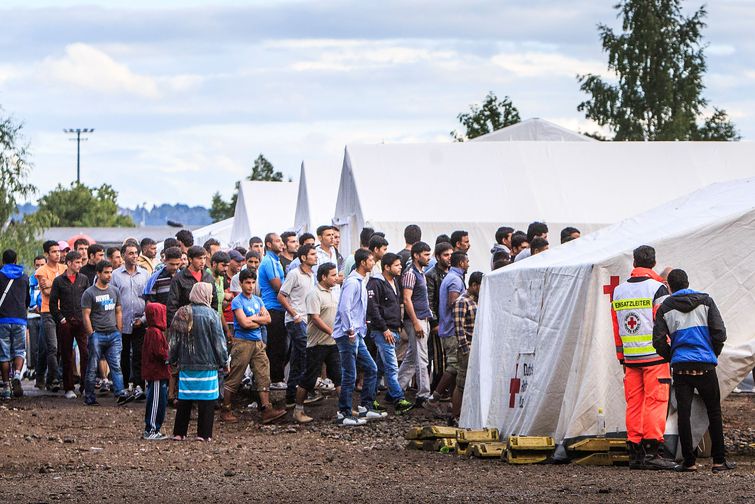Germany just did something huge for Syrian refugees — and for the future of Europe
2 posters
Page 1 of 1
 Germany just did something huge for Syrian refugees — and for the future of Europe
Germany just did something huge for Syrian refugees — and for the future of Europe
 Refugees wait at a temporary Red Cross camp in Dresden, Germany. (Carsten Koall/Getty Images)
Refugees wait at a temporary Red Cross camp in Dresden, Germany. (Carsten Koall/Getty Images) German Chancellor Angela Merkel did something really good this week: Her country will now allow Syrian refugees, who normally would be deported back to wherever they first entered the European Union, to stay and apply for asylum. Thousands of Syrians who would have otherwise faced uncertainty in Europe can now begin the process of rebuilding their lives in Germany.
Germany, with the stroke of a pen, has just given an awful lot of Syrian families the chance to start a new life. But this is even more important than that: In addition to being a blessing for these Syrians, it is also a gift to Europe. Migration has become a crisis so great for Europe that, earlier this month, Merkel called it an even bigger challenge for the EU than the Greek debt crisis. She is now leading by example, showing Europe what it must do to overcome that crisis.
Migration has become a crisis for migrants and for Europe

A refugee family after being rescued from the Mediterranean (Matthew Mirabelli/AFP/Getty Images)
The policy change couldn’t be more necessary. The EU is facing its largest refugee crisis since World War II, and the human cost has already been devastating. Just on Thursday, two boats filled with would-be migrants sank off the coast of Libya, leaving hundreds feared dead, and a semi truck filled with dozens of decomposing corpses, including young children, was found by the side of a highway in Austria. Far from all of these migrants are Syrian, but Syrians, driven to flee by their country's civil war, are the largest group by nationality.
But rather than address that human devastation directly, EU countries have for the most part sought to avoid taking any responsibility for it at all. When refugees arrive, EU rules leave them and other migrants trapped in their first countries of arrival until their asylum claims have been processed. For many, that means being marooned in Italy or Greece, which are facing full-scale humanitarian crises as refugee numbers overwhelm the available housing and supplies.
According to Human Rights Watch, for instance, the Greek reception centers where arriving refugees are held lack sufficient food and health care, and are so severely unsanitary and chronically overcrowded that the conditions in them may amount to cruel, inhuman, and degrading treatment under international law.
Under EU rules, if any of these migrants make their way into Germany, then Germany is supposed to deport them back to their EU country of first arrival. But now, with this change, Syrians can stay in Germany to apply for asylum there. That's a big deal, and could help thousands of the world’s most vulnerable people stay safe from persecution, and from squalid camps in Greece or Italy. Merkel and her government deserve credit for making this important change, particularly at a time when asylum policy is an increasingly volatile political issue in Germany.
Perhaps just as important, this is also a step toward addressing one of the most serious political problems facing the EU: how to fairly share responsibility for the migrant crisis.
The new policy will help vulnerable people find safety and stability more quickly

An Italian rescue worker carries an infant saved from a migrant boat. (GIOVANNI ISOLINO,GIOVANNI ISOLINO/AFP/Getty Images)
Under an EU rule called the Dublin Regulation, refugees are supposed to stay in the first European country they arrive in until their asylum claims are processed. In theory, this rule is a way to prevent applicants from "orbiting" the EU by filing application after application in different countries until one of them finally gets approved. But in practice, it’s a rule that has trapped thousands of refugees in Greece and Italy, simply because those countries are the easiest ones to reach by boat across the Mediterranean. And it also has allowed the rest of the EU to push the burden of handling those refugees onto these two countries.
Greece and Italy, understandably, do not think that's fair. In June, Italian President Matteo Renzi threatened that if the EU did not offer more help, Italy might issue visas to undocumented migrants en masse, allowing them to travel to other European countries. This week, Merkel and French President François Hollande convened a summit in Berlin to find a fairer, EU-wide solution to the crisis. This crisis, after all, is not just a problem for Italy and Greece: The lack of an EU-wide solution to the migrant crisis threatens the open borders that are a core mission and purpose of the EU.
But so far, other EU countries have been distinctly unwilling to share responsibility for the crisis. They're not helping because, quite simply, they don't want to and they don't have to. But their obstinance is not really how the EU is supposed to work, and Renzi's threat gets to the heart of that contradiction.
Germany's rule change helps to undo that contradiction just a little by taking on a fairer share of the refugee burden. In addition to being good for the refugees, and for Italy and Greece, this is also good for the EU as a whole, by making the burden of immigration a little more bearable, and thus the European project more sustainable.
But this in itself is not enough to resolve the crisis for migrants in Europe or for Europe itself. Not even close.
The rest of Europe needs to follow Germany's lead

Migrants walk towards the port of Calais in northern France. (PHILIPPE HUGUEN/AFP/Getty Images)
What we should hope for is that Germany's reprieve for migrants will set an example, and become one of many steps in Europe toward a fairer system for refugees.
In the absence of a unified solution to the migrant crisis, individual countries across the EU are adopting individual solutions. These are primarily focused on keeping migrants out, and include countries quietly reimposing border controls — against the open-borders spirit of the EU — to prevent refugees from entering their territory.
That's not illegal — they're not changing Schengen visa requirements, just increasing enforcement of the existing rules — but it is a step away from the ideal of an open, unified EU. And it's easy to see how the restrictions could become stricter in the future if the EU can't arrive at a unified solution to the crisis.
Germany's suspension of Dublin processing for Syrians won't be enough to solve that problem on its own. And of course Germany shouldn't be expected to solve the EU migrant crisis by itself any more than Greece or Italy should. But by voluntarily accepting more responsibility for Syrian refugees, Germany has reduced the pressure on other EU countries, and perhaps made an eventual solution that much easier to reach.
By taking that step unilaterally, Germany has distinguished itself from the "no more than the absolute bare minimum, and actually maybe not even that" approach that countries like the UK are pursuing. It's leading by example. Here's hoping other countries will follow
http://www.vox.com/2015/8/28/9220395/germany-migrant-crisis
Germany, showing more compassion than UK, we should be ashamed.
Guest- Guest
 Re: Germany just did something huge for Syrian refugees — and for the future of Europe
Re: Germany just did something huge for Syrian refugees — and for the future of Europe
Is there a law that states the size of the country per how many asylum seekers they are supposed to take?
ie Germany is bigger than UK so should they take more?
ie Germany is bigger than UK so should they take more?

eddie- King of Beards. Keeper of the Whip. Top Chef. BEES!!!!!! Mushroom muncher. Spider aficionado!
- Posts : 43129
Join date : 2013-07-28
Age : 25
Location : England
 Re: Germany just did something huge for Syrian refugees — and for the future of Europe
Re: Germany just did something huge for Syrian refugees — and for the future of Europe
Syrian refugees shouldnot use it as an excuse to go anywhere they want... they should go to first safe country and stay there.

Tommy Monk- Forum Detective ????♀️
- Posts : 26319
Join date : 2014-02-12
 Similar topics
Similar topics» Growing number of Syrian refugees in Germany making 'reverse escape' to Turkey
» 4 out of 5 refugees not syrian????
» non halal and syrian refugees
» So Germany are now saying that isis are arriving there pretending to be refugees
» Germany welcomes refugees with sex education website
» 4 out of 5 refugees not syrian????
» non halal and syrian refugees
» So Germany are now saying that isis are arriving there pretending to be refugees
» Germany welcomes refugees with sex education website
Page 1 of 1
Permissions in this forum:
You cannot reply to topics in this forum
» TOTAL MADNESS Great British Railway Journeys among shows flagged by counter terror scheme ‘for encouraging far-right sympathies
» Interesting COVID figures
» HAPPY CHRISTMAS.
» The Fight Over Climate Change is Over (The Greenies Won!)
» Trump supporter murders wife, kills family dog, shoots daughter
» Quill
» Algerian Woman under investigation for torture and murder of French girl, 12, whose body was found in plastic case in Paris
» Wind turbines cool down the Earth (edited with better video link)
» Saying goodbye to our Queen.
» PHEW.
» And here's some more enrichment...
» John F Kennedy Assassination
» Where is everyone lately...?
» London violence over the weekend...
» Why should anyone believe anything that Mo Farah says...!?
» Liverpool Labour defends mayor role poll after turnout was only 3% and they say they will push ahead with the option that was least preferred!!!
» Labour leader Keir Stammer can't answer the simple question of whether a woman has a penis or not...
» More evidence of remoaners still trying to overturn Brexit... and this is a conservative MP who should be drummed out of the party and out of parliament!
» R Kelly 30 years, Ghislaine Maxwell 20 years... but here in UK...